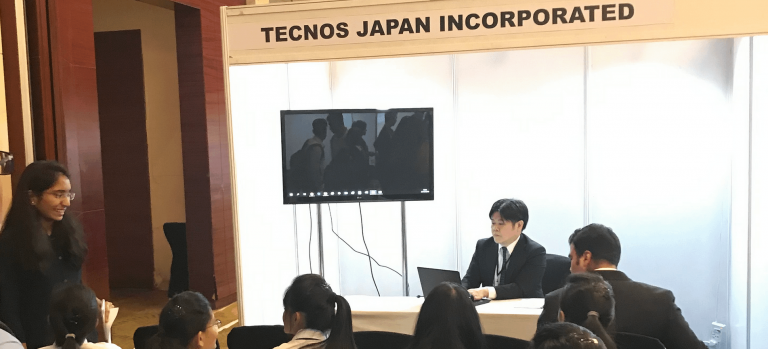We interviewed Mr. Takashi Yoshioka, President and Representative Director.
When did you start working on hiring foreign personnel?
More than 10 years ago, we used to hire one or two foreign nationals a year, but when we had four or five, they all quit our company and changed jobs. After that, we stopped hiring for a while. We restarted again in the last few years and are now hiring.
What is the reason for restarting?
We want to hire people who can compete globally, but it is difficult to secure the number of people we want if we target only Japanese. Also, in 2018 we acquired an American cloud integrator company with a development base in India. When we think about expanding globally, we also want to bring in foreign personnel.
Currently, in addition to hiring foreign students in Japan, we are recruiting from multiple angles, including visiting various countries and participating in ASIA to JAPAN’s Study Go Work JAPAN interview sessions. In February 2019, we also participated in a job fair in Pune, India, hosted by the Ministry of Economy, Trade and Industry (METI)「Nippon New Network for Innovation (NIN2)」.
How was the job fair?
I was not able to meet with candidates very efficiently, partly because it was our first time participating and lack of preparation. However, I got the impression that Japan is still attractive from the Indian point of view. Pune has sister city relations with Okayama Prefecture and Nagoya City in Japan, and Japanese language education is flourishing there, so I think they are even more positive about working in Japan. It was good to get that kind of impression.
However, we rarely met the “people with Japanese language skills and IT skills” that we wanted. In order to get our target personnel to enter the program, we need to properly communicate about our company, so it may be necessary to look at it from a long-term perspective rather than just participating.
The path for Indians to find jobs in the U.S. is almost closed now, so in that sense, I feel that India is a promising market for us in terms of securing human resources. However, we would like to recruit from a variety of countries with an awareness of diversity, rather than limiting the number of countries.
To what extent do you place importance on Japanese language skills?
Basically, we are looking for both Japanese and English. If you just want to do programming, there is no problem even if you cannot speak Japanese. But if you want to do consulting, you will need to communicate with Japanese clients, so Japanese language skills are required. During the selection process, we give them a simple theme and give them a paper test to write about it, which is used as a reference to determine their Japanese language level.
Nevertheless, we have recently begun to hire people who cannot speak Japanese on a trial basis. We also have employees who can speak English, so communication within the company is not 100% in Japanese. We are having them work in English while supporting their Japanese language studies. We will review the level of Japanese we are looking for as we see how well this approach works.
What do you think are the differences in the selection process for non-Japanese and Japanese candidates?
I meet all candidates for the final interview, regardless of nationality, and of course it depends on the person. However, I would say that foreign personnel tend to be more motivated and passionate, at least during the hiring stage. I believe that this is due more to differences in personal qualities, such as “taking a positive step forward when trying to work abroad,” rather than national characteristics.
Please tell us about the changes that have occurred in your company as a result of hiring foreign personnel.
It has only been a few years since we resumed hiring foreign personnel, but the atmosphere is changing: we acquired an American company in 2018, and we have more foreign personnel in our Tokyo office. The atmosphere at our company’s general meetings and drinking parties is clearly changing, and I think our employees have a sense that we are becoming more globalized.
On the other hand, we need to think about how long foreign employees will work for our company and how we should follow up with them. Currently, there are no particular problems due to cultural or religious differences, but we may need to take some measures in the future, and Japan is also unique in terms of its systems. For example, in terms of the wage curve, there is a complete difference between the framework in other countries and Japan. In other words, foreign framework is people earn money by working hard while the Japanese framework is that wages increase with age in accordance with the seniority system. The question is, “Since we are a Japanese company, can we continue to operate in the Japanese way?” This is an issue, and we need to consider how to deal with the differences.
What do you expect from your existing employees as the number of non-Japanese employees increases in the future?
I would like them to actively communicate with foreign employees because it is an opportunity to experience different cultures while still in Japan. It should be a positive. I also hope that they will be able to collect information from a variety of countries and acquire wide perspective with foreign workers. By changing to an environment where employees can feel that there are diverse ways of thinking, I expect that they will be stimulated by foreign personnel with different backgrounds, thereby broadening their perspectives. I hope that the positive attitude and enthusiasm of foreign personnel will spread to existing employees, fostering a positive culture.

